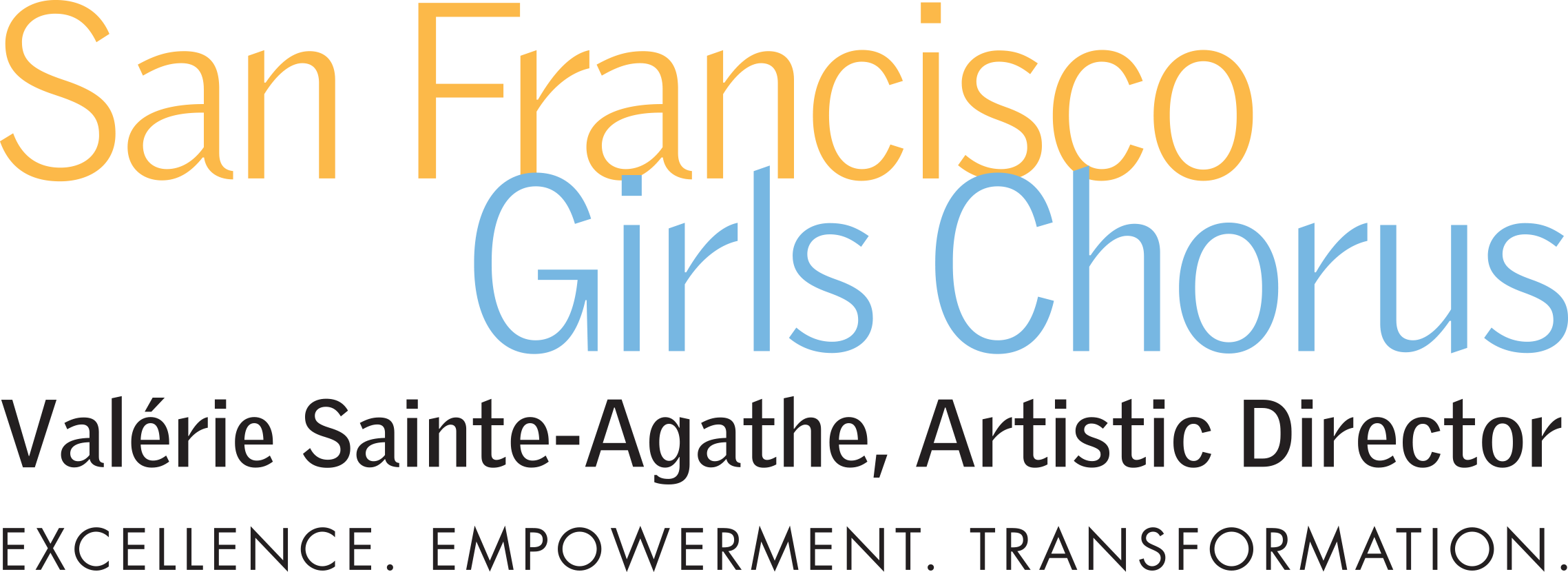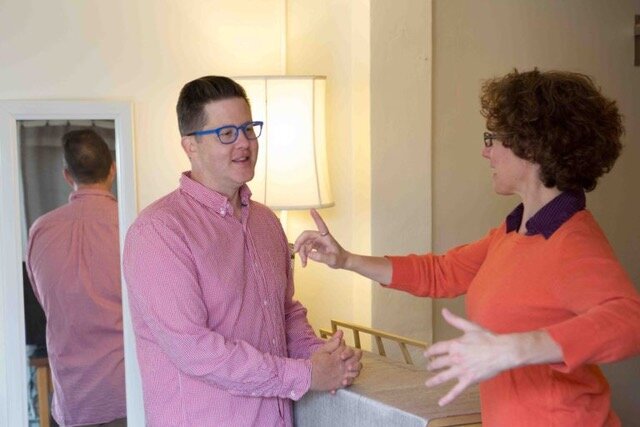Postcard from Guest Instructors: Meghan Dibble and Lisa Mezzacappa
This week’s postcard is from Meghan Dibble and Lisa Mezzacappa, two of our guest instructors who are working with Premier Ensemble this fall as part of our online Elective series. Meghan is Professor of Vocal Pedagogy at the San Francisco Conservatory of Music (SFCM) and is teaching our weekly Vocal Pedagogy Elective classes. Lisa is a bassist, composer, and band-leader and is leading our choristers in weekly sessions as part of our Improvisation Elective classes.
Meghan Dibble teaching students at the San Francisco Conservatory of Music
Meghan Dibble
How did you first learn about SFGC?
SFGC Director of Voice Studies Justin Montigne and I belong to our local chapter of NATS (National Association of Teachers of Singing), and over the years I have had the pleasure of adjudicating some of the SFGC singers he sponsored at our Singing Festival. When looking for volunteer singers to participate in free voice lessons with my graduate pedagogy students at SFCM, Justin suggested some of the SFGC singers. It has been a wonderful collaboration.
How did you become a musician/singer? Tell us about what you’ve done and what you do now.
I sang in school choirs while growing up, and a highlight was singing as part of a multi-school choir at Disneyland. In my last year of high school, I forced myself to audition for the school musical and while I got one of the leads, that experience convinced me I really needed voice lessons. After singing in a few college operas, I was hooked on the solo singing. Upon completing my undergraduate music degree, I attended Northwestern University as a graduate student in voice. I’ve sung all over the US with regional opera companies, and once I settled in the Bay Area I began to pursue teaching privately and in higher education. That was more than 15 years ago. Currently, I serve on the faculty at SFCM and Skyline College in San Bruno.
Meghan Dibble teaching student Sara Johnson at the Community Music Center in San Francisco
A lot of our choristers have parents who are not musicians - what would you like to tell them about what it means for a young person to be doing music?
Singing can create serotonin and endorphins to create a happier healthy human. Sharing the creative process with others helps to build a supportive community. Working hard to achieve a high level of skill builds confidence. These are some of the ways in which singing can benefit a young person. Being able to creatively express myself through music and helping others do the same has brought joy to my life.
Meghan Dibble working with a student.
For those girls who do wish to become professional musicians - anything you’d like to share with them?
The keys to becoming successful are curiosity, determination and community. In order to build skills to a professional level, musicians need to foster a sense of curiosity about their instrument. Becoming a skillful musician is a lifelong endeavor, and professional musicians are always striving to improve their abilities. Determination and persistence are vital to getting through the times when success seems impossible. And finally, we need a community that supports and believes in us. No one succeeds in a bubble.
Why is it important to continue practicing music and have online performances in this time of pandemic?
What we are missing most during the pandemic is community. Even on Zoom, we can foster a sense of community and shared goals. Practicing alone, without objective feedback can cause us to lose steam and stop our forward momentum. Creating music with others, even in this online context is important for our mental health.
Anything you would like to add? Especially about the work with our choristers?
I’ve been having a great time in conversation with the singers of the SFGC; thoughtful questions, curious minds, and support of one another. It’s a joy to experience.
Lisa Mezzacappa
Lisa Mezzacappa
How did you first learn about SFGC?
Of course I’ve known about SFGC for many years – you guys are local stars! I’ve always been so impressed by the diversity of the chorus’ programming and by the range of composers the chorus has worked with over the years.
How did you become a musician? Tell us about what you’ve done and what you do now.
My first instrument was the clarinet at age 9, and then after that I added alto sax. I started playing electric bass when I was a teenager, and then upright bass starting in college. That’s when I discovered jazz, though improvisation has always been a part of making music for me, starting with the times I would get together with friends after school and on the weekends to jam and write songs.
I moved to California nearly 20 years ago to study ethnomusicology at UC Berkeley—and at the same time became immersed in the Bay Area’s vibrant music community. For many years, I have worn several hats—as a bassist, an ensemble leader, a composer, and a concert organizer. I also love teaching bass and improvisation.
A lot of our choristers have parents who are not musicians - what would you like to tell them about what it means for a young person to be doing music?
I am also the first musician in my family, but I was so fortunate to be supported by my mother, who (now that I think of it as an adult!) spent every weeknight and all of her free time driving me to orchestra, concert band, and jazz band rehearsals after she got home from work, and then every weekend shuttling me to my friends’ houses where the rock bands I played in rehearsed. When I got older, she’d buy me tickets to the classical and chamber concerts I wanted to see, and drive me to see all-age inclusive shows at local rock and punk clubs. I was consumed by music from a really early age and had a lot of ideas about what I wanted to do, hear, try—and her answer was always “yes”.
As a young person I remember feeling like being a musician insulated me from a lot of the petty dramas and stresses at school. Even though teenage years can be weird and challenging times, I liked being really good at something and it was nice to focus on practices and rehearsals—to get lost in the music and escape a little bit from all the other things in my life that felt emotional, unsolved, and out of my control at that age. Music for me was very grounding and centering—both a private pleasure and a really fun group activity. (I guess I can still say these same things about playing music now as an adult!)
Liza Mezzacappa conducts duo B. Experimental Band
For those girls who do wish to become professional musicians - anything you’d like to share with them?
I was fortunate to inherit a pretty serious work ethic from my family, and that has served me very well on this crazy, unpredictable path as an artist. There is a point at which talent runs out—you can’t coast on the innate musical gifts you were born with forever. But if you are focused and committed and not afraid to roll up your sleeves to do what needs to be done, you can have a rich and full life in music. People want to work with you when you are generous, reliable, dedicated, and considerate, besides being a good musician. The other thing is not to give up. Most people in your life won’t understand this drive to be a musician, and what it takes to excel at it—so you will have to make hard choices over and over again to keep this dream front and center as you move through your life.
Why is it important to continue practicing music and have online performances in this time of pandemic?
I keep telling myself we have to think long term and remember that these months are just a blip in the big picture of the music we need to create and the work we need to put out into the world. As an improviser, 100% of my musical life is based on live, in-the-moment interaction, so I have felt the loss of these months without playing [live] music very profoundly. I don’t always succeed, but I’ve been trying to commit to working within the constraints of our current COVID situation, and letting those constraints reveal new ways of making music, new ways of growing and challenging ourselves as performers. It is our job to persist—what else do we do, just stop singing? Stop playing? It’s not an option.
Anything you would like to add? Especially about the work with our choristers?
In the coming months I’ll be working with the choristers in the Premier Ensemble to develop skills in music improvisation. Though it’s certainly a challenge to do this online, I’m so thrilled we will have a chance to explore this very fundamental musical skill together, to each become more comfortable being composers in the moment. For me, regardless of the musical style or genre a musician is drawn to, being able to improvise makes us all better listeners, more responsive collaborators, and overall more present human beings. I’m really looking forward to where these workshops will take us.
Lisa Mezzacappa conducts






